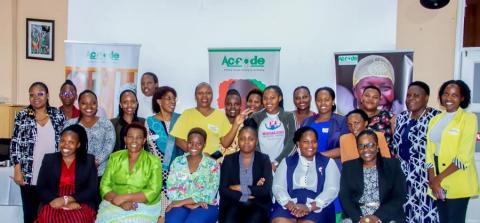
In July 2010, Uganda made a significant stride towards gender equality by ratifying the Maputo Protocol, an African Union instrument designed to promote and protect women's rights across the continent.
Against this background, Action for Development, with support from the Strategic Initiative for Women in the Horn of Africa, hosted a knowledge-sharing session on 23rd October in Kampala with Women’s Rights Organisations to discuss the best ways in which the Maputo Protocol can be fully domesticated in Uganda without reservations.
Lead facilitator Susan Aceng highlighted the protocol's roots in the African Charter and its crucial role in addressing women's unique challenges in Africa, particularly in areas such as violence against women, reproductive health rights, Women's Participation in leadership, and economic empowerment.
It is crucial to note, however, that some participating organizations are implementing activities that align with Articles in the Maputo protocol; the most outstanding were Articles 5,6,3,2,5, and 13. “As Institute for Social Transformation, we contribute to about 7 Articles in the Maputo Protocol, we build the capacities women in decision making, we also provide a revolving fund to the women groups especially those in the markets…” said a representative.
It was further noted that it is not easy to domesticate the Protocol that has reservations, Uganda faces a complex journey toward fully domesticating the protocol. Initial advocacy efforts by women's rights organizations like Akina Mama wa Afrika were pivotal in raising awareness among stakeholders about the protocol's significance. Through a dedicated task force, extensive advocacy campaigns, and media engagement, these organizations sought to inform political leaders and civil society about the need for the protocol to be ratified but despite the success Uganda still had reservations about Article 14, which promotes and protects women's health and reproductive rights. This has since brought a lot of contention in the political, and social radar as any proposed law with an element of SRHR is met with doubt.
However, Uganda has made progress since then notably reforming the Succession Act to enhance gender equality in inheritance rights, the Prohibition of Female Genital Mutilation Act, 2010, the Prevention and Prohibition of Torture Act,2012, the Markets Act, the Amendment of the Employment Act 2022, Minimum wage Act 2019.Operationalization of the Equal Opportunities Commission operations, implementation of Affirmative Action across all public institutions, Structural Adjustment of the GBV Desk countrywide, Gender aggregation of the enrollment trends, and the second National Development plan among others.
However, proposed laws like the Marriage Bill have met substantial backlash, with only a fraction of its clauses passing through Parliament amid cultural and political tensions. These are not the only challenges, as poor and low implementation, negative cultural perceptions and practices, Limited knowledge of the protocol, inadequate resource allocation, a disconnect between substantive equality for women and girls in accessing justice, slow judicial processes, and slow legal form equally make it very hard to domesticate the Protocol.
“Domestication of the Maputo Protocol is not easy with reservations however there can be a way,” said one of the participants.
Some of the strategies to enhance the implementation of the Maputo Protocol, key among these is raising awareness among stakeholders, including government agencies and law enforcement, to ensure a comprehensive understanding of the protocol’s provisions, capacity building for grassroots organizations, increasing on the reporting time, ensuring sustainability of projects that promote the protocol, ensuring that the protocol is included in the school curriculum and recruiting a lead organization in spearheading any activities around the same integrating advocacy into existing programs to enhance sustainability, while regional and international engagement will broaden support for women’s rights across borders.
As Uganda continues to navigate the complexities of domestication, the path forward involves not just legal reforms, but a collective effort to change societal attitudes towards women’s rights. The successful implementation of the Maputo Protocol could herald a new era of gender equality and empowerment in Uganda, ensuring that women's rights are not just recognized, but realized.
